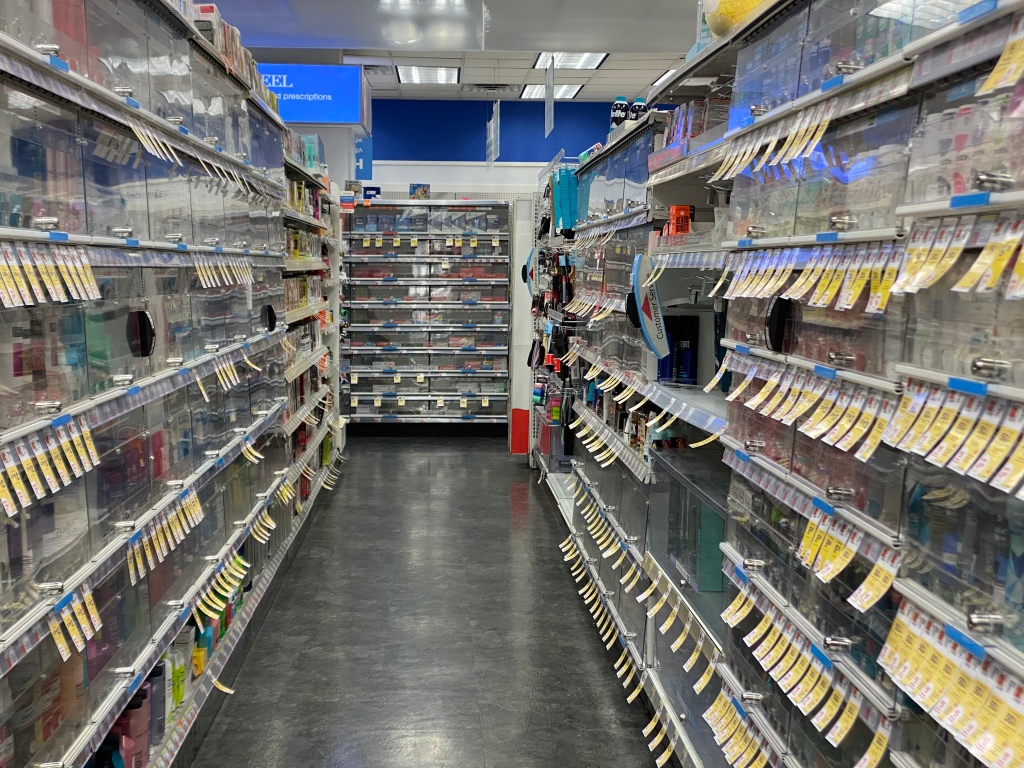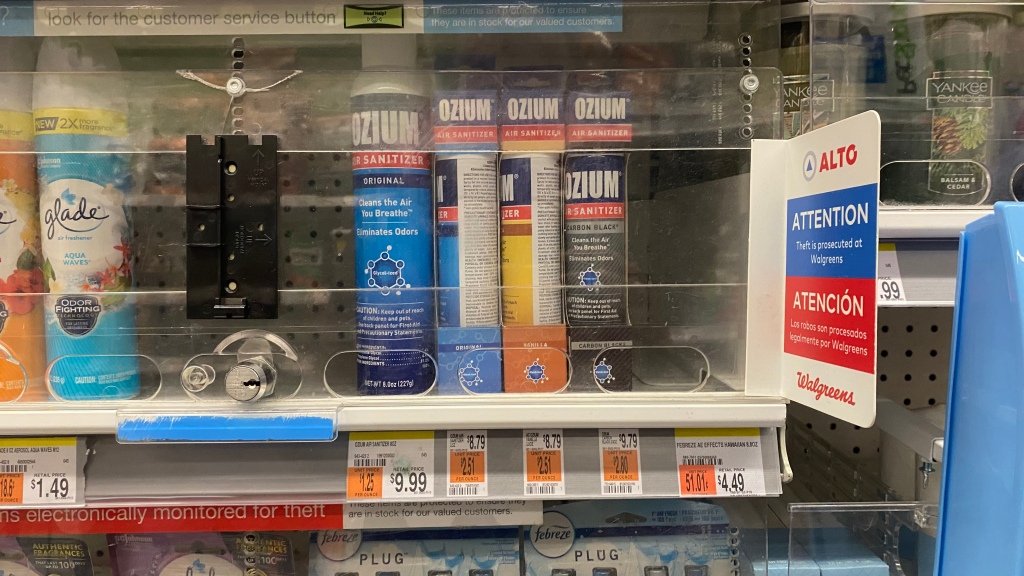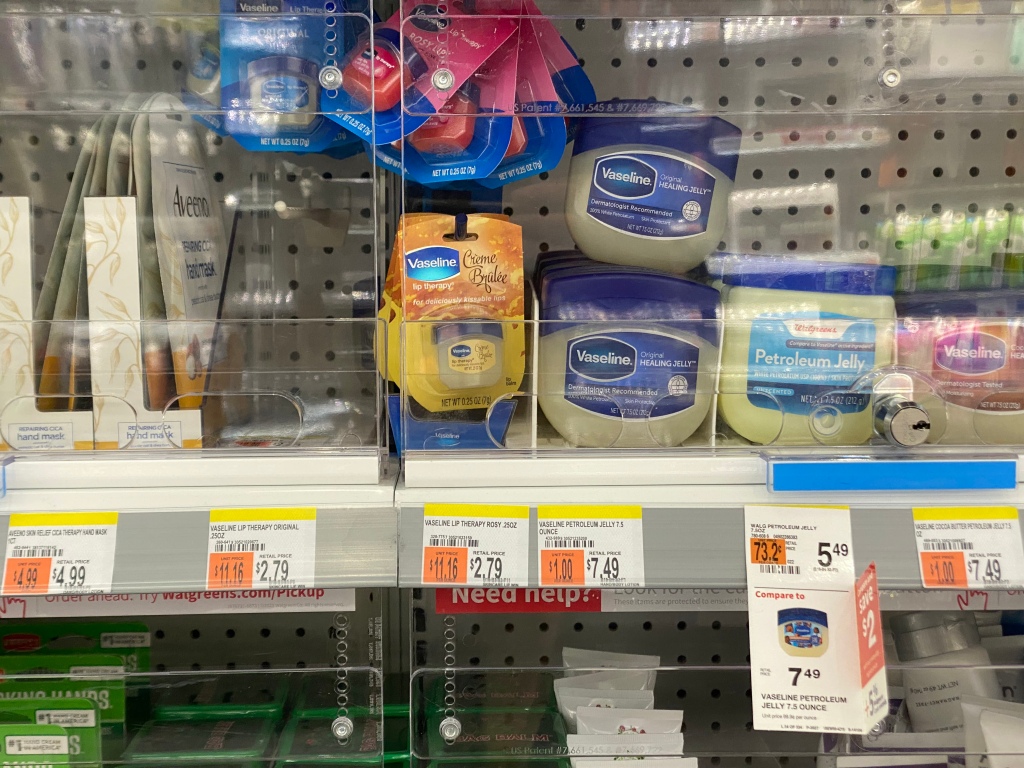Shoplifting crisis is so bad shoppers struggling to find non-locked-up items
You thought locking up Spam was stingy? This is a whole different kettle of fish.
The shoplifting crisis plaguing the nation has become so bad that fed-up shoppers are now struggling to get their hands on even the most basic essentials — which are increasingly being stashed away under heavy lock-and-key.
A $3.99 can of the cheap meat Spam was protected in plastic, anti-theft cases at a Duane Reade in Manhattan’s Port Authority last summer — and now even a lousy tin of tuna at half the price is getting the same treatment at one of the chain’s stores in Penn Station under Madison Square Garden.
The Post visited a handful of shops in the Big Apple on Friday to find a slew of low-priced items — including Dawn dishwashing liquid ($2.19), Vaseline lip balm ($2.79), kids toothbrushes ($3.99), Cadbury chocolate ($3.99) and the $1.79 can of tuna — locked in cabinets that require customers to ring a bell and then wait for employees to eventually get them.
“I be coming and ringing that bell all the time to get what I need,” said frustrated shopper Karen Brown, 62, as she tried to flag down a staffer to hand over antihistamines at the Duane Reade at the Port Authority Bus Terminal.
“It’s totally annoying.”
Brooklyn resident Kay O’Neil, 37, stressed that shopping at some stores now is nothing but a hassle with more and more products caged up.
“It’s a struggle. It makes your day longer,” he said of waiting for employees to unlock items at the shops — which have transformed from quick stops to pick up a few essentials to inconvenience stores.
“If you pick this one and want another one, you gotta call them twice,” he added, pointing to the array of locked-up face creams at a Walgreens in Brooklyn’s Kensington neighborhood.
About 75% of consumers say they are now relegated to shopping in stores where products are being locked up in cabinets to avoid rampant theft, according to a new National Retail Federation survey that recently polled 5,000 shoppers nationwide.
A Walgreens in crime-riddled Chicago rolled out a new store layout this week that locks away all but two aisles of products from shoppers as part of a reported push to crackdown on rife shoplifting.

The store made the move at least partly to “mitigate theft,’’ according to an e-mail sent to a concerned customer from the company, CWB Chicago reported.
A rep for the mega pharmacy chain told The Post that the company is trying to test out a digitally driven shopping experience — but wouldn’t confirm it is also trying to thwart thieves.
The introduction of the locked-up Chicago store comes as retailers across the country continue to battle an ongoing spate of thefts and smash-and-grab robberies, which has sparked chains to shutter in large cities, including San Francisco.
In the Big Apple, retail thefts have spiked by 77% over the past five years, according to the latest NYPD stats.
The number of incidents has only dipped slightly so far this year — even though there are more cops on the retail beat and Mayor Eric Adams has been pushing a long-awaited retail theft strategy plan. There were 13,738 reported retail thefts through the end of March this year, compared to the 14,790 over the same span in 2022, the data shows.

Currently under New York’s bail laws, perps busted stealing items less than $1,000 can be slapped with a petit larceny charge — a misdemeanor that is non-bail eligible.
Hizzoner has proposed a change to that law that would allow district attorneys across the five boroughs to combine multiple petit larceny charges for repeat offenders, which would enable an upcharge to grand larceny — a bail-eligible felony — if the thefts amount to more than $1,000.
Half of those polled in the National Retail Federation survey, which was released Thursday, said police — and the courts — are too lenient on shoplifters.
“It’s not going to change because they keep stealing. It’s not going to stop because the economy is going down the toilet,” said Brown, a retired Rikers Island corrections officer, while waiting for service at the Port Authority Duane Reade.
“The consequences for stealing aren’t severe,” she continued, adding she saw people run off with a “whole shelf of stuff” in the same store last week. “When they steal from these stores, [authorities] hit them with a citation and tell them to go home.

“They don’t lock them up, they give them a Desk Appearance Ticket and let them go home, so why wouldn’t they just grab something and walk out with it?” Brown added.
Emily Milbouer, a 69-year-old retired school employee, blamed the slight downtick in city shoplifting arrests during the first quarter this year on the number of products now being locked up.
“They should start arresting people for doing the wrong thing,” she fumed at the Kensington Walgreens.
“It’s the way society is right now,” she said of crime with little to no consequences. ” The answer is to arrest people for doing wrong — the way it used to be.”
The Big Apple isn’t the only major city grappling with rampant shoplifting.
San Francisco has become a mecca for organized retail crime in recent years ,after the state reclassified nonviolent thefts as misdemeanors for stolen goods worth less than $950.
Employees at a Target location in downtown San Francisco revealed last month that their store is plagued by at least 10 robberies each day.
And the crime-battered retail giant revealed in its first-quarter earnings report it expects to suffer as much as a $1.3 billion hit to its bottom line because of “theft and organized crime.”
Additional reporting by Craig McCarthy
Read the full article Here


